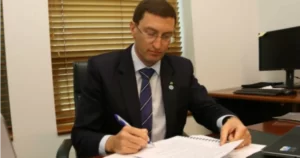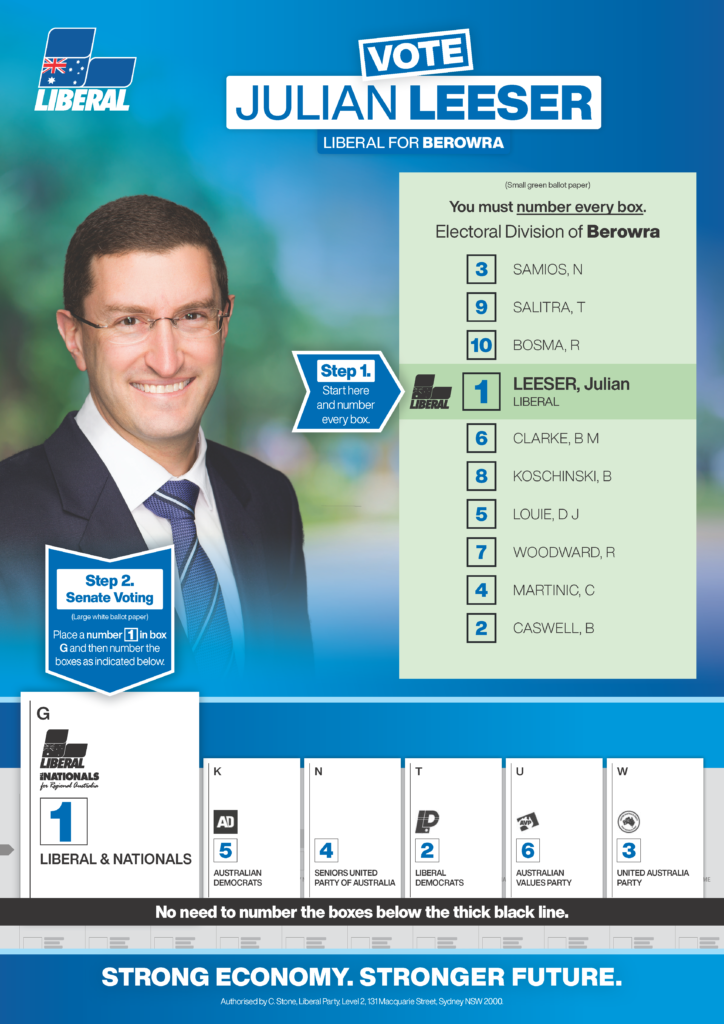I rise to pay tribute to John Spender KC, lawyer, politician and diplomat, and it’s a particular privilege to pay tribute to him in the presence of his daughter, the member for Wentworth. I only had the opportunity to meet John once, when I was working at Australian Catholic University and he was a visiting fellow in our newly created law school. While I didn’t know him well, I wanted to say a few words about some of the things we had in common. There are two in particular that I think of, and I’m grateful to the member for Wentworth for pointing one of those out.
I went to Cranbrook School in Sydney. To date, I had always thought there were only two of us who’d been to Cranbrook who served in this place. One was Dugald Munro, who was the Liberal member for Eden-Monaro from 1966 to 1969; the second was myself. But the member for Wentworth tells me that her father, who served as the Liberal member for North Sydney from 1980 to 1990, spent part of his years at our old school, so it’s lovely to have that in common.
John Spender came from a distinguished family. His mother, Jean, was a published author, and his father, Sir Percy Spender, was the principal architect of the ANZUS treaty and the Colombo Plan and, like his son, served in the diplomatic corps as ambassador to the United States. When you think about the ANZUS treaty and the Colombo plan as two of the fundamental pillars of our postwar strategic policy, to have been involved in even one of them would have been remarkable, but to have been involved in both really speaks to the extraordinary service of Sir Percy Spender, and that service no doubt helped imbue his son with a calling for public service when he came to serve in this place.
John Spender held a number of portfolios throughout his career, one of which was shadow Attorney-General, the role that I now have today. He was appointed to that role in 1985 by John Howard when he was Leader of the Opposition. Since being appointed to that position myself, I’ve actually appreciated the opportunity to better familiarise myself with his work from this period, and that’s where I’m going to confine my remarks.
John Spender launched the opposition’s law and justice policy in June 1987. Now, it’s interesting to reflect today, in a world where political parties’ policies might be a few dot points on a pamphlet, that in those days, in the pre-Fightback era and at least until Fightback, there were well-developed, philosophically argued policies, and that was certainly true of the coalition’s legal policy in 1987. It was a particularly important articulation re-establishing the core values of the coalition as we regrouped in opposition, and many of the tenets he outlined remain true today. It’s particularly useful, in outlining our approach to constitutional reform—an issue that was regularly debated in parliament at that time—to have a look at some of those issues from my own perspective today.
Like myself, John was firmly opposed to a bill of rights for Australia in those times. I went and read his speech on the proposed bill of rights act, and it’s worthwhile quoting some of the words that he used, because I think they remain as true today as when he spoke them then. He said:
The fundamental protections of human rights in our country are to be found in the courts, in tolerance and fair play, in a sense of justice and a belief in democratic institutions, in support for the rule of law, in respect by the majority for the rights of others and in restraint in the exercise of power. Where are these virtues, so cardinal to democracies, to be found in Russia, Afghanistan and Libya-all signatories to the International Covenant on Civil and Political Rights?
… … …
The Australian Bill of Rights Bill is a sham. To call it a Bill of Rights is to pervert the English language. It would be better described as a Bill of violations …
Similarly, he quoted the Chief Justice of Australia, Sir Harry Gibbs, who said: ‘If society is tolerant and rational, it needs no bill of rights. If it was not, then no bill of rights would preserve it.’
In his time as shadow Attorney-General, John Spender was opposed to radical constitutional change. When the Labor Party put forward the proposal of a brand-new constitution for Australia without any detail, John Spender responded strongly:
We do not need a brand new Constitution, nor does the Constitution need radical revision, nor is there any groundswell of opinion in Australia for radical revision. By their nature Constitutions can never be perfect documents, but over the years the Constitution has served us well and Australians traditionally and wisely have been suspicious of those who call for unspecified radical changes to our foundational law.
John Spender stood strongly for the independence of our legal institutions. When the Labor Attorney-General Lionel Bowen requested the then Director of Public Prosecutions to halt contempt proceedings against the New South Wales Labor Premier Neville Wran, John Spender stood up because this action fundamentally undermined the rationale for establishing the independent Director of Public Prosecutions, which was to remove decisions about prosecutions from political interference. He saw his role as protecting Australians from the threat of organised crime as well.
John Spender supported increased telephone interception powers for law enforcement in order to crack down on growing organised crime in Australia to protect people from life-threatening situations, but it was important to him that these measures were paired with relevant safeguards to prevent the misuse of such extraordinary powers, including increased penalties for illegal interception and that such operations be accountable to the parliament. This was particularly relevant when international terrorism became an issue of growing public concern in the 1980s. A terrorist attack by the Palestine Liberation Front in 1985 saw the hijacking of the cruise liner Achille Lauro. I remember this event so vividly for its absolute terror. There were many Americans on board. The terrorists grabbed and brutally murdered a 69-year-old Jewish man, Leon Klinghoffer, who was in his wheelchair, before throwing his body overboard. In the wake of this barbaric act, John Spender travelled to the United States and was ahead of his time in calling for international action on terrorism saying:
The time is long overdue for concerted, highly organised and planned action by the Democracies against international terrorism. Ad hoc measures are not enough to ensure the protection of our societies and our people, who are in the front line.
Sadly, although the vicissitudes of politics meant that he never got to serve as a minister, the former Prime Minister John Howard, who is enormously respected on our side, described him as a very good colleague and a very successful frontbencher, and, of course, John Howard appointed him Ambassador for France on coming into government.
I wanted to take this opportunity to outline a few of the issues that John Spender pursued as shadow Attorney-General and also to take this time to offer my condolences to John Spender’s family and friends, especially his wife, Catherine; his stepson, Alexander; and his daughters, Bianca and our colleague the member for Wentworth. I hope they continue to draw inspiration from the life of a very significant Australian. May his memory be a blessing.




